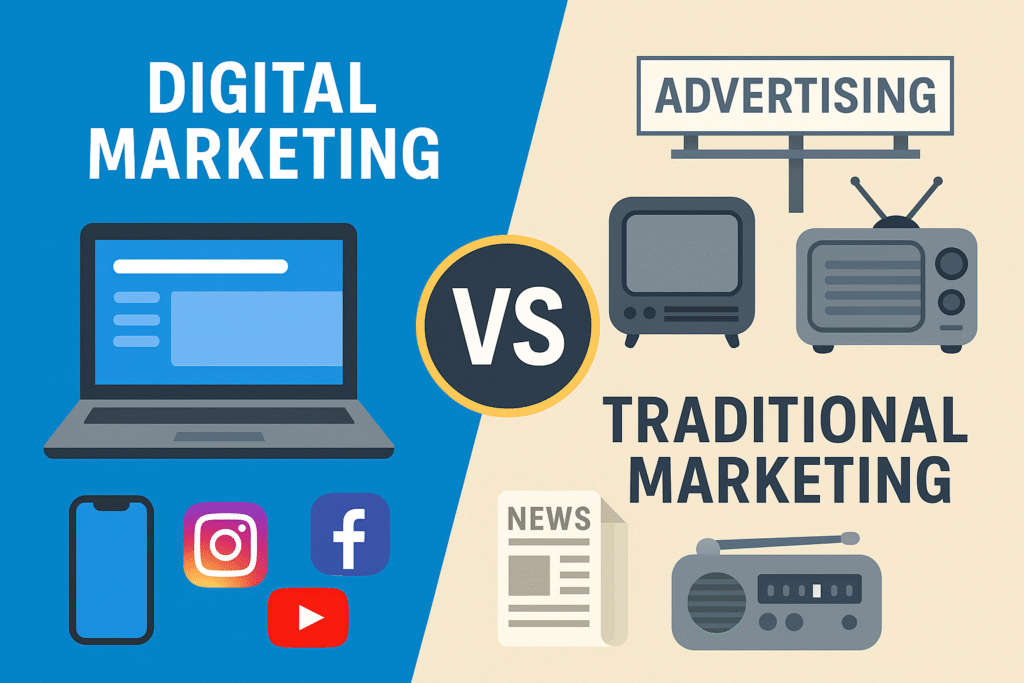

In the fast-changing world of advertising, businesses often face the question: Digital Marketing Versus Traditional Marketing — which one should you focus on?
Understanding the difference between these two marketing strategies can help you build a smarter plan to grow your brand effectively.
In this blog, we’ll break down the meaning, advantages, and best uses of digital marketing versus traditional marketing so you can decide what’s best for your business.
What Is Traditional Marketing?
Traditional marketing uses classic offline methods like:
-
Television commercials
-
Radio advertisements
-
Print ads in newspapers and magazines
-
Billboards and flyers
-
Direct mail campaigns
Before the rise of the internet, traditional marketing was the primary way to reach audiences. It remains powerful today, especially for reaching local customers and older generations.
What Is Digital Marketing?
Digital marketing focuses on promoting brands through online platforms such as:
-
Websites and blogs
-
Social media channels (Facebook, Instagram, LinkedIn)
-
Search engines (Google, Bing)
-
Email marketing
-
Paid advertising like Google Ads or social media ads
The debate of digital marketing versus traditional marketing mainly comes down to how and where you connect with your audience.
Key Differences Between Digital Marketing and Traditional Marketing
Let’s look at the major factors where digital marketing and traditional marketing differ:
| Factor | Traditional Marketing | Digital Marketing |
|---|---|---|
| Audience Reach | Local or mass audience | Targeted global audience |
| Cost | Higher production and media costs | Lower, scalable budget |
| Interactivity | One-way communication | Two-way engagement |
| Measurability | Hard to track success | Easy with analytics |
| Customization | Limited | Highly personalized |
When comparing digital marketing versus traditional marketing, it’s clear that digital marketing offers more flexibility and real-time control.
Benefits of Traditional Marketing
While digital methods dominate headlines, traditional marketing still has strong points:
1. Tangibility
Physical materials like business cards or flyers can leave a lasting impression.
2. Wide Local Reach
TV, radio, and newspapers are effective for reaching local audiences who may not be online often.
3. Brand Credibility
High-quality traditional advertising (like a TV spot) can increase a brand’s perceived trustworthiness.
However, when analyzing digital marketing versus traditional marketing, the cost and limited tracking options in traditional methods can be drawbacks.
Benefits of Digital Marketing
Digital marketing brings a long list of advantages that often make it the go-to strategy today:
1. Cost-Effective
Even a small budget can launch a successful digital campaign.
2. Measurable Results
You can track every click, impression, and sale easily.
3. Precision Targeting
Reach users based on age, location, interests, and even behaviors.
4. Easy to Update
Campaigns can be modified anytime for better performance.
This gives digital marketing versus traditional marketing a major edge, especially for businesses that want data-driven growth.
Which Marketing Strategy Should You Choose?
Choosing between digital marketing versus traditional marketing depends on your:
-
Target Audience: Older demographics may respond better to traditional media, while younger ones are almost always online.
-
Budget: Traditional marketing often requires higher upfront investments.
-
Goals: Want to build broad awareness quickly? Traditional could work. Want fast results and detailed tracking? Go digital.
Many modern brands use a combination of both to maximize results.
Future Trends: Why Digital Marketing Is Growing
The discussion around digital marketing versus traditional marketing is shifting.
Digital channels are growing rapidly because:
-
Internet access is increasing worldwide.
-
Mobile devices dominate consumer behavior.
-
Platforms like TikTok, Instagram, and YouTube offer new ways to connect.
-
Artificial intelligence and automation are making digital campaigns smarter.
While traditional media won’t disappear, digital marketing is clearly the future for most businesses.
Final Thoughts
The debate of digital marketing versus traditional marketing isn’t about picking a single winner.
Both methods have their strengths and can serve different goals.
If you want targeted reach, real-time tracking, and flexible campaigns, digital marketing is essential.
If you want broad exposure and long-term brand trust, traditional marketing still has value.
The smartest brands today combine both strategies — using traditional marketing for brand building and digital marketing for engagement and conversion.
When it comes to digital marketing versus traditional marketing, the real secret is knowing how to balance them based on your business needs.

